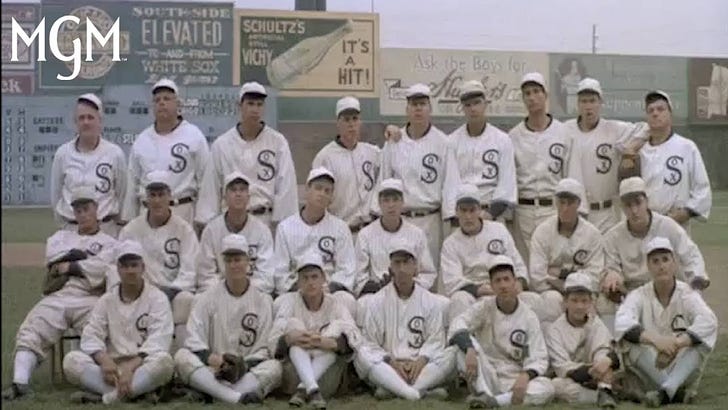Eight Men Out at 35: Getting "Shoeless Joe" right
Part of a glut of baseball movies in the late '80s and early '90s, John Sayles' film was less mystical but more truthful exploration of the legend of "Shoeless Joe" Jackson.
Field of Dreams' status as an all-timer baseball movie is so secure that Major League Baseball has taken to hosting an annual "Field of Dreams Game," on a cornfield in Iowa. (What I wouldn't give for a Major League Game or, even better, a Bull Durham Game.)
But despite that, there are quite a few knocks on Field of Dreams that have emerged over the years, often shared by my friend Craig Calcaterra. Like, why would a son making an innocuous comment about his dad's favorite baseball player cause a permanent estrangement? Why would a 1960s Black radical writer like Terrence Mann have such a soft spot for segregation-era baseball? Why does a movie in which the hero and his wife are idealistic ex-hippies have such reactionary values?
But one thing about Field of Dreams angers baseball historians more than anything else: It totally got "Shoeless Joe" Jackson wrong.
Ray Liotta played Jackson as a right-handed hitter (he batted left), without a Southern accent, and much more articulate than the real Jackson — who was illiterate — actually was. Sure, it was a work of magical realism about ghosts surfacing in 1980s Iowa to help a boomer hippie-turned-farmer resolve his longstanding daddy issues. But come on- let's be real!
However, a year before Field of Dreams, there was another baseball movie, Eight Men Out, which told the story of the reason for Shoeless Joe's disgrace and infamy: The scandal in which eight members of the 1919 Chicago White Sox were bribed by gamblers to throw the World Series and were subsequently banned from the game for life.
Adapted from Eliot Asinof's book of the same name. Eight Men Out was written and directed by John Sayles, who had previously made Return of the Secaucus 7, The Brother From Another Planet, and Matewan.
It's vintage Sayles, offering a bit of a lefty revisionist take on the Black Sox scandal: Whereas baseball history, for the most part, has viewed the players as shameful degenerates, Eight Men Out argues that the players were being exploited by cheapskate owner Charlie Comiskey, about six decades before players were granted free agency, and took the gamblers' money more out of need than anything else. Comiskey is shown, among other things, benching a player so he won't qualify for contract incentives- something that baseball owners still do to this day.
Beyond that, the film provides a more sympathetic, and accurate version of Shoeless Joe: He's portrayed by D.B. Sweeney as an illiterate bumpkin who, most likely, didn't actually understand the bribery scheme, and signed a confession that he couldn't read. Shoeless Joe is actually a relatively minor part of the film, although at least he stands on the correct side of the plate.
He is the focus, however, of the film’s incongruously cornball final scene:
The first two-thirds of the movie follow the scheme, and the thrown World Series itself, while the final third depicts the criminal trial, in which the eight players were acquitted, although they were banned from baseball for life and permanently disgraced.
This is one of those movies from that era in which all of the roles are played by fantastic actors. Michael Lerner is delightfully slimy as the fix's mastermind Arnold Rothstein, although I'm rather partial to Michael Stuhlbarg's take on Rothstein on Boardwalk Empire. John Cusack is Buck Weaver, who neither took money nor threw games, but was banished anyway because he didn't blow the whistle on the scheme.
Eight Men Out arrived in September of 1988 — 35 years ago this week — and was part of the glut of memorable baseball movies during the late 1980s and early 1990s. Bull Durham, Eight Men Out, Field of Dreams, Major League, The Babe, A League of Their Own, Rookie of the Year, The Sandlot, Angels in the Outfield, Cobb, and Little Big League all arrived between 1988 and 1994, although the best baseball scene of that period — the third act of 1988's The Naked Gun — didn't come from any of them.
It's a strange movie to watch nowadays when the sports leagues have dropped all pretense of caring about gambling or collecting revenue from gambling concerns, even as the NFL continues to suspend players for making errant bets.
Speaking of John Sayles, I once interviewed the director, when I was in my college newspaper and he was promoting his 1997 movie Men With Guns. What they were even thinking, putting a filmmaker of that stature in the room with a 19-year-old who had only taken Intro to Film, I'll never understand.
Eight Men Out is available to stream on Prime Video, Tubi, and Pluto TV.




8 myths about the scandal. https://sabr.org/eight-myths-out
https://jacobpomrenke.com/black-sox/book-introduction/ This is well researched